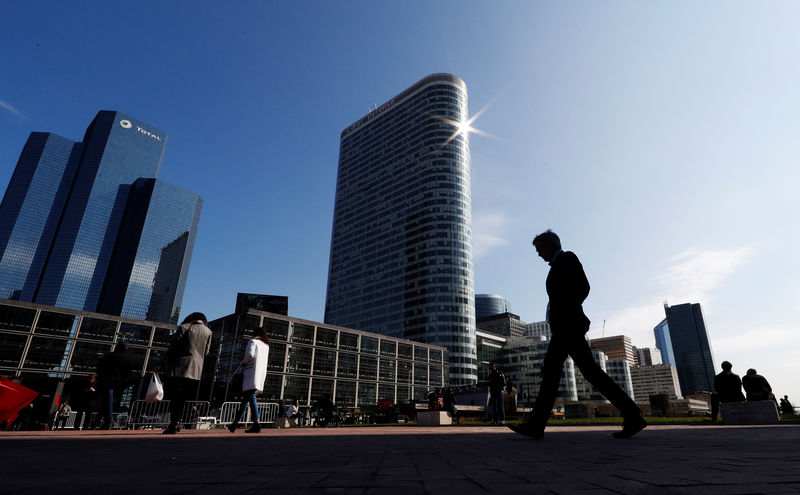By Leigh Thomas
PARIS (Reuters) - French business confidence plunged to a more than two-year low in December after violent anti-government protests as the economy closes the year on a rough note, official data showed.
The confidence slump implies the economy has slowed since growth peaked this year in the third quarter at 0.3 percent, which Friday's data showed was weaker than previously thought.
The INSEE statistics agency said its business confidence index fell to 102 points in December from 105 last month - the lowest level since November 2016.
Confidence in the retail sector suffered particularly badly after Paris saw the worst unrest in decades from "yellow vest" demonstrators during crucial, pre-holiday shopping days this month. The index for the retail sector fell to 100 from 107, its lowest since January 2015.
Many businesses in central Paris have had to board up on Saturdays after some had windows broken during the rampaging through some of the French capital's poshest neighborhoods.
Parisian department store Printemps for one has seen sales at its flagship store slump around 10 percent in December, its Chief Executive Pierre Pellarey told Franceinfo radio.
The protests have also hit hotels in the world's top tourist destination, costing the industry in Paris 18 million euros ($20.6 million) in lost revenue from cancellations.
Earlier this week, INSEE forecast the economy likely slowed to 0.2 percent growth in the final quarter due in part to the protests over fuel tax hikes squeezing household budgets.
Already in the third quarter, the economy grew only 0.3 percent from the previous three months, INSEE said on Friday, revising down from a previous estimate of 0.4 percent.
After tax hikes and transport strikes weighed on activity in the first half of 2018, the economy is on course for soft full year growth, which INSEE has forecast at 1.5 percent.
The third quarter data lent some credence to protesters' claims their purchasing power is squeezed by high taxes.
The government offered concessions this month aimed at boosting the poor's income.
INSEE said households' real disposable income growth slowed to 0.4 percent in the third quarter from 0.8 percent in the previous three months as wage growth slowed and the tax burden rose.
Nevertheless, consumer spending grew 0.4 percent in the quarter after pulling back slightly in the previous period as households saved marginally less.
The savings rate eased to 14.4 percent from 14.5 percent.
Meanwhile, corporate investment rose 1.5 percent as firms' profit margins advanced to 31.9 percent from 31.7 percent in the second quarter, boosted by productivity gains, INSEE said.
